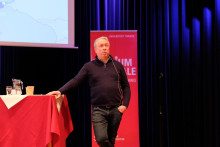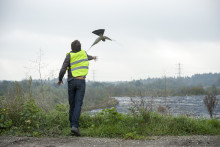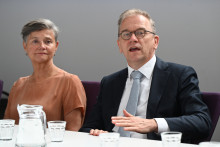 |
| Thérèse ter Heide-Noll will be honored at a farewell reception on February 6 at the Vestingbar. Photo: Jan Hesselink |
`It was very difficult to adjust to the new culture. I missed my friends and relatives,' she recalls. She completed her studies and joined the University in 1971. That was to mark the beginning of a long relationship.
`I have seen the UT change a lot over the past few years. New buildings have sprung up everywhere, but what I really like is the fact that more and more international students have chosen to study at the UT. It is a good sign,' she says. She misses the coffee breaks that were a ritual in the olden days. `We still have them, but it is not the same. People are in a hurry. They do not realize that coffee breaks are not a waste of time. They are a great place to exchange ideas,' remarks Heide-Noll.
She has worked in various departments during the last three decades. However, she says the last four years at the International Office was what she enjoyed the most. `I love interacting with international students and solving their problems, or listening to their worries. I often had to be their guide, their friend and sometimes even a psychologist.' Her favorite memories are of the international events that she attended. `My hope is that all the international associations will be recognized by the Student Union. This will make it a lot less expensive for associations to host events and they will not have to pay money to rent University facilities.' It is this desire to help international students that has made her so popular.
Before joining the International Office, Heide-Noll worked at the Emancipation Office at the UT. Getting more females interested in technical subjects is an issue she holds dear. `When I first started working at the UT, there were few female students. At that time, women were not interested in technical studies. Things are different now.' The Emancipation Office was instrumental in bringing about many changes. In addition to increasing awareness about technical subjects among female students, the office also helped provide facilities to make it easier for females to combine studies or a career with having a family. The Vlinders, a daycare center at the University, was started as an initiative of the since dissolved Emancipation Office. One of its other projects, the Pre-Introductie Practicum or PIP, was started 15 years ago. `It is still running and is very successful in getting a greater number of female students in typically male dominated faculties like physics, computer science or construction technology,' she says.
What are her post-retirement plans? `I love learning different languages. I know Dutch, French, English, German, Indonesian and Javanese. I plan to begin learning Italian and Japanese. I have already obtained a diploma which enables me to teach Dutch to students. In the future, I will continue to teach Dutch language to foreign students at the UT.'
In addition to teaching a few courses, she will be working as a volunteer at a hospice, caring for the terminally ill. `I lost my husband and my brother to cancer and know that terminally ill patients have many things that they do not feel comfortable sharing with their family. They fear it will cause them too much pain. It is much easier to open up to an outsider,' she says.
Ter Heide-Noll believes retirement provides the ideal moment to indulge in activities that one passionately loves. With her free time, she plans to cook for her friends and continue to take dance lessons at `Tango y Tanga,' a school for Argentines dance. Her lifelong credo being: `A happy mind resides in a fit body.'
What will she miss the most when she leaves the UT? `I am not really leaving the UT. I am just retiring from my current position and will always be around to help with anything the UT needs me for.'







